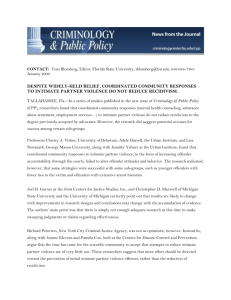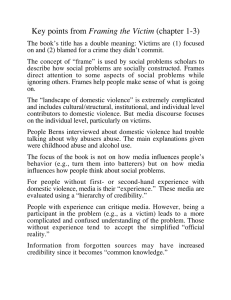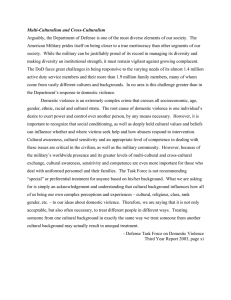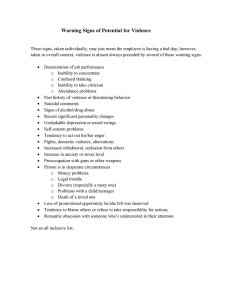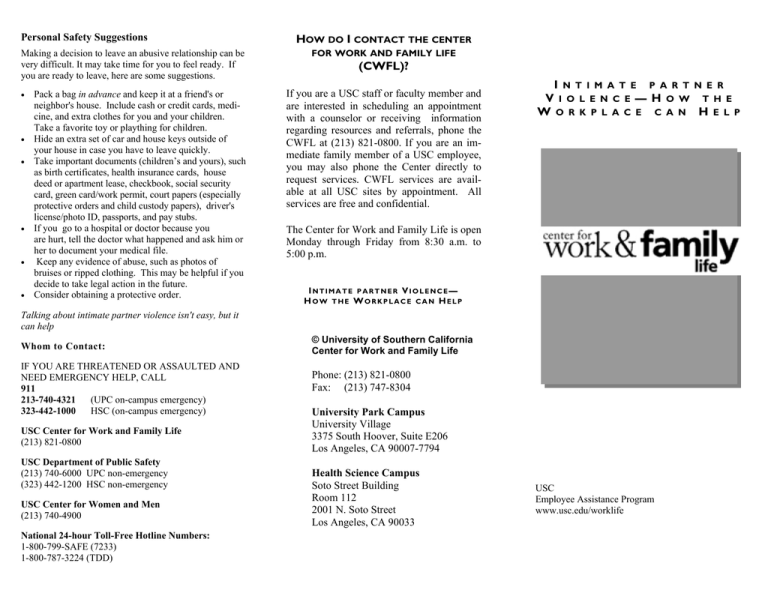
Personal Safety Suggestions
Making a decision to leave an abusive relationship can be
very difficult. It may take time for you to feel ready. If
you are ready to leave, here are some suggestions.
•
•
•
•
•
•
Pack a bag in advance and keep it at a friend's or
neighbor's house. Include cash or credit cards, medicine, and extra clothes for you and your children.
Take a favorite toy or plaything for children.
Hide an extra set of car and house keys outside of
your house in case you have to leave quickly.
Take important documents (children’s and yours), such
as birth certificates, health insurance cards, house
deed or apartment lease, checkbook, social security
card, green card/work permit, court papers (especially
protective orders and child custody papers), driver's
license/photo ID, passports, and pay stubs.
If you go to a hospital or doctor because you
are hurt, tell the doctor what happened and ask him or
her to document your medical file.
Keep any evidence of abuse, such as photos of
bruises or ripped clothing. This may be helpful if you
decide to take legal action in the future.
Consider obtaining a protective order.
HOW DO I CONTACT THE CENTER
FOR WORK AND FAMILY LIFE
(CWFL)?
If you are a USC staff or faculty member and
are interested in scheduling an appointment
with a counselor or receiving information
regarding resources and referrals, phone the
CWFL at (213) 821-0800. If you are an immediate family member of a USC employee,
you may also phone the Center directly to
request services. CWFL services are available at all USC sites by appointment. All
services are free and confidential.
I
N T I M A T E P A R T N E R
V IOLENCE — H O W THE
W ORK P LACE CAN H E LP
The Center for Work and Family Life is open
Monday through Friday from 8:30 a.m. to
5:00 p.m.
INTIMATE PARTNER VIOLENCE—
HOW THE WORKPLACE CAN HELP
Talking about intimate partner violence isn't easy, but it
can help
Whom to Contact:
IF YOU ARE THREATENED OR ASSAULTED AND
NEED EMERGENCY HELP, CALL
911
213-740-4321
(UPC on-campus emergency)
323-442-1000
HSC (on-campus emergency)
USC Center for Work and Family Life
(213) 821-0800
USC Department of Public Safety
(213) 740-6000 UPC non-emergency
(323) 442-1200 HSC non-emergency
USC Center for Women and Men
(213) 740-4900
National 24-hour Toll-Free Hotline Numbers:
1-800-799-SAFE (7233)
1-800-787-3224 (TDD)
© University of Southern California
Center for Work and Family Life
Phone: (213) 821-0800
Fax: (213) 747-8304
University Park Campus
University Village
3375 South Hoover, Suite E206
Los Angeles, CA 90007-7794
Health Science Campus
Soto Street Building
Room 112
2001 N. Soto Street
Los Angeles, CA 90033
USC
Employee Assistance Program
www.usc.edu/worklife
I
N T I M A T E
P A R T N E R
People often feel tension in their personal relationships.
However, intimate partner violence goes beyond a disagreement, a marital spat, or an anger management
problem, and is not an isolated event.
What is Intimate Partner Violence?
Intimate partner violence can be defined as a pattern of
assaults and controlling behaviors—purposefully conducted by an intimate partner in a current or former
dating, marital, or cohabitating relationship— that restrict the activity, independence, and safety of the other
partner or former partner. It is used to gain or maintain
power and control. Intimate partner violence can happen to anyone regardless of race, age, socioeconomic
background, sexual orientation, religion, or gender.
More than 1 in 3 Americans has witnessed an incident
of intimate partner violence. While over 90 percent of
all victims of intimate partner violence are women, men
are also victims both in same sex and heterosexual relationships.
Intimate Partner Violence Can Include:
•
•
•
•
Physical abuse,
such as hitting,
slapping, shoving,
grabbing, and
pinching.
• Sexual abuse, such
as marital rape, attacks on sexual parts
of the body, and using
threats of violence
to coerce or force sex.
Emotional abuse, such as undermining an individual’s sense of self-worth and/or self esteem, constant criticism, blaming, humiliation, and namecalling.
Economic abuse, such as withholding access to
money, taking car keys, denying money for daily
expenses, or forbidding attendance at school or
work.
Psychological assaults, such as stalking, causing
fear by intimidation, discrediting the partner’s
reputation, isolating partner from family, friends, or
work, or threats of violence/ harm to self, partner,
children, pets, or partner’s family or friends.
V
I O L E N C E
— H
O W
T H E
W
O R K P L A C E
Intimate Partner Violence Is a Cycle
The first phase is one of
increased tension and arguing.
The second phase is the
actual act of abuse – hitting, kicking, slapping,
verbal threats.
The third phase is called
the “honeymoon phase”
during which perpetrators
apologize and promise “it will never happen again,” and the
victim feels loved and hopes for change. Despite these promises, the cycle tends to repeat indefinitely.
The workplace is an ideal place to get help and support, as
many spend significant time there, away from their abuser.
Be supportive:
•
Listen without judging, emphasize safety, offer to help
•
Refer the person to The Center for Work and Family Life
for confidential advice and resources
E L P
To create a safety plan, both for home and work, victims of intimate partner violence can:
•
Look into flexible or alternate work hours
•
Notify security of safety concerns, and provide a
picture of the abuser
•
Find ways to have calls screened
•
Review the safety of parking arrangements
•
Consider relocating the work space
•
Review the safety of child care arrangements
•
Specify restriction of the perpetrator from the
workplace in orders of protection, if obtained
Are you Being Abused?
Does the person you love...
Threaten to hurt you or your children?
Yes
No
Say it's your fault if he or she hits you, then promise
it won't happen again (but it does)?
Yes
No
Put you down in public or keep you from contacting
family or friends?
Yes
No
Throw you down, push, hit, choke, kick, or slap you?
Yes
No
Force you to have sex when you don't want to?
What Supervisors and Co-Workers Can Do:
Be alert to the warning signs of intimate partner violence:
•
Frequent absences from work or arriving late
•
Frequent doctor appointments
•
Hypersensitivity to touch and loud noises
•
Signs of depression or crying at work
•
Discussions about stress at home
•
Isolation from friends, family, and co-workers
•
Repeated or unexplained physical injuries, and attempts
to cover these
•
Changes in behavior or work performance
H
A Workplace Safety Plan
Intimate Partner Violence Affects the Workplace
Intimate partner violence can interfere with an individual’s
ability to safely and confidently perform duties at work. It
may involve harassment, including repeated phone calls or
emails, or a perpetrator showing up at the partner’s place of
work. Sleep deprivation, due to stress and violence at home,
can also affect work. Physical injuries often keep victims out
of work. Thus, intimate partner violence routinely causes reduced productivity and performance, as well as increased
medical expenses and absenteeism.
C A N
Yes
No
Just one "yes" is a sign of an abusive relationship. If
this is the case, you're not alone. Help is available.
The Facts
•
•
•
Estimates range from 960,000 incidents of violence against a current or former spouse, boyfriend, or girlfriend per year (Family Violence
Prevention Fund).
In 2001, women accounted for 85% of the victims of intimate partner violence (588,490 total),
while men accounted for approximately 15 percent of victims (103,220 total) (Stats - Office on
Violence Against Women).
Worldwide, at least one in every three women
has been beaten, coerced into sex, or otherwise
abused during her lifetime.

